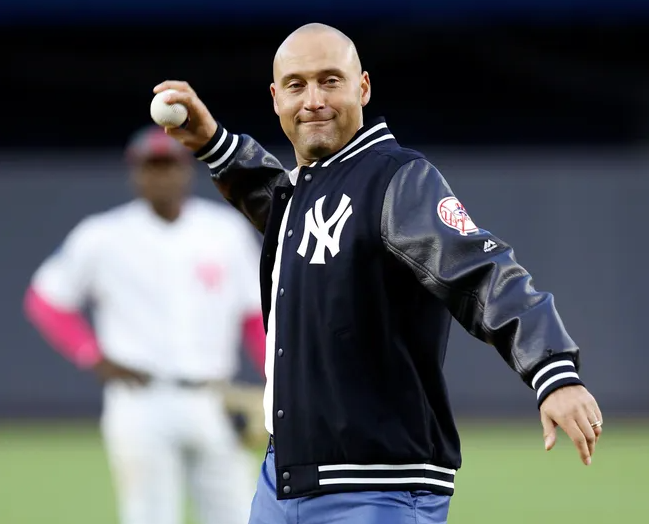The Captain, a seven-part series about Derek Jeter, will premiere on Monday, July 18, at 10:00 p.m. Eastern Time (ET). Randy Wilkins, who has won an Emmy for his work, will direct the series, which will be executive produced by Spike Lee and Mike Tollin.
Interviews will be conducted with members of Jeter’s family, friends, and professional sports colleagues for the documentary. Jeter’s wife Hannah Jeter, his sister Sharlee Jeter, and his parents Dorothy and Dr. Charles Jeter will be among those interviewed. Roger Clemens, Tino Martinez, Andy Pettitte, Jorge Posada, Willie Randolph, Mariano Rivera, Alex Rodriguez, CC Sabathia, Darryl Strawberry, Joe Torre, Bernie Williams, Fat Joe, and Jadakiss all make appearances in the documentary series.
The first episode, according to ESPN, will focus on Derek Jeter’s “upbringing as a biracial boy in the Midwest and his journey to the professional leagues,” and will include previously unseen footage of Jeter being drafted by the Yankees.
“We set out on a journey to discover the identity of the man who wore the legendary number 2 Yankees jersey,” Wilkins explained. “Through the course of the series, we reveal a person who stands at numerous crossroads of American culture, which not only sheds light on a baseball career that has been inducted into the baseball hall of fame but is also fascinating in its own right.” “The Captain” is a story about race, the media, celebrity culture, and the unquenchable desire to be the best version of yourself.
The Captain’s second episode will air on July 21 at 9 p.m. Eastern Time (ET). Extra episodes are scheduled to air every Thursday until August 11th. Check out the entire schedule right here.
The Captain was produced by The Players’ Tribune and Major League Baseball in collaboration with Lee, Tollin, Mandalay Sports Media, Excel Media, and Connor Schell. The project’s executive producers were Lee and Tollin.
“The Captain,” ESPN’s new documentary series, is currently in its sixth episode and has already acknowledged the difficulty of breaking down its chosen subject. Derek Jeter may have been an exceptional shortstop and an iconic Yankees player whose spectacular ascension and decline paralleled his team’s own history as a New York sports dynasty. From 1993 to 2009, Jeter was the Yankees’ shortstop. He is also known for being a very meticulous (read: boring) interview subject, which he acknowledges in himself as well as the several dissatisfied journalists who were unable to get past his surface.
On camera, Jeter confirms, “that was on purpose,” before breaking into a genuine smile at the admission. He even goes on to say that “there are still things I won’t talk about” for the ostensibly in-depth documentary series on his own life. “There are some things I still won’t discuss” (which premieres July 18 after the Home Run Derby and will run seven episodes in total). This paradox is at the heart of Randy Wilkins’ “The Captain,” which can only go as far as Derek Jeter himself will allow.
According to Derek Jeter, the character that emerges in the first few episodes is that of a consummate professional who worked hard, achieved success, and avoided distractions at all costs. In general, the only time Derek Jeter comes close to revealing anything even remotely personal is when he discusses the impact his biracial upbringing in Kalamazoo, Michigan, had on his “must be twice as good as everyone else” mentality later in life. Interviews with Jeter’s Black father, white mother, and biracial sister emphasise this point, demonstrating that even when white journalists thought of Jeter as “colourless” — a direct quote from a Yankees beat reporter in a later episode, much to Jeter’s clear and atypical rage — it couldn’t be further from the truth. This is also highlighted in interviews with Jeter’s Black father, white mother, and biracial sister.
This discussion about how people perceived Derek Jeter as a star and as a Black athlete who was given opportunities that other athletes, including those on his own team, were not given is extremely interesting (as could be expected from a series that also counts Spike Lee as an executive producer). It appears only a few episodes into the series’ investigation into what made Jeter such a phenomenon. Even if it’s by design, this feels far too late to keep casual ESPN viewers engaged when they might have switched channels at the first mention of race. The series explores what made Jeter such a baseball phenomenon.
When speaking about baseball, Jeter adheres to the standard he has set for himself throughout his career by keeping his statements as simple as possible. The contrast between him and someone like Alex Rodriguez, his more bombastic rival turned teammate, could not be clearer in juxtaposed recollections of past grievances. Derek Jeter sits through a tight smile while Rodriguez throws up his hands about putting his foot in his mouth. Jeter is the quieter of the two. “The Captain” will inevitably become more of a deep dive on the Yankees of the late 1990s and early 2000s as a cultural juggernaut, while remaining anchored to Jeter’s presence as its narrative constant. This is because Jeter’s interview is not even close to being the most revealing in the series.
As a result, if you’re interested in baseball in general, or even if you’re only vaguely aware of the Yankees’ complete dominance at the turn of the century, there’s plenty to think about in this article. Not only A-Rod, but also Daryl Strawberry, Jorge Posada, Mariano Rivera, manager Joe Torre, and Dave Winfield, Jeter’s personal favourite player, have thrown their support behind Derek Jeter. There are times when sports journalists and other New Yorkers who were influential during Derek Jeter’s and the Yankees’ heyday weigh in to provide context for how and why this club and player became what they did. However, because Derek Jeter is the ostensible main character, “The Captain” is unable to delve into the nitty gritty of what made the Yankees so good — or, when they lost to a team like the 2004 Boston Red Sox, so frustrating — in sufficient depth to genuinely please the audience. (Don’t bother looking for Derek Jeter’s comments about Alex Rodriguez vs. Jason Varitek because they aren’t even mentioned in the conversation.)
As a result, the series frequently struggles to say much more about Jeter beyond what we already know. This is because Jeter is constantly on the lookout for ways to avoid disclosing too much information. However, because he is so hesitant to show emotion, the times when he does, even if only slightly, seem all the more illuminating. Despite its subject’s best efforts, “The Captain” becomes even more compelling when Derek Jeter allows himself to be a little petty, smug, or a sorrier loser than his scrupulously courteous post-game interviews would imply. This is due to Jeter’s willingness to expose himself in these ways.
The first episode of “The Captain” will air Monday, July 18 at 10 p.m. on ESPN and ESPN+.



















































































